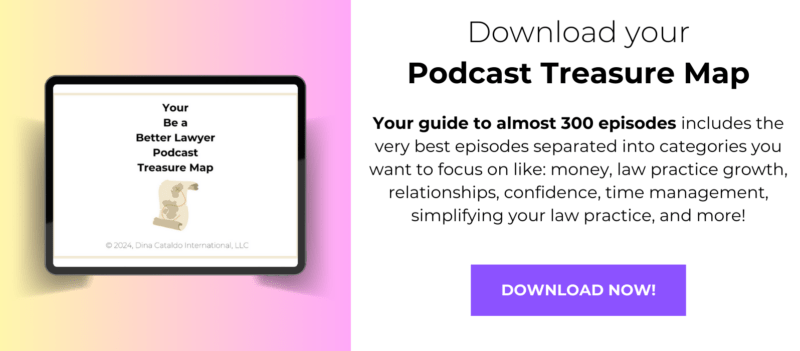Yes, high-achievers can be people-pleasers.
In fact, a majority of the female lawyers I've spoken to have struggled recognizing that they're a people-pleaser and removing this block.
It stems from our need to control.
I believe people in high-powered professions are especially susceptible to this because part of our job description is to be in control at all times.
That means having control of other people's perceptions too.
Listen in to hear if you fall into the people-pleaser category and how you can keep it from hindering your growth.
UPDATED RESOURCES
- Click here to grab all my most current resources for lawyers
- My absolute favorite book on people-pleasing is Boundary Boss by Teri Cole. You can get it here.
- Book a Strategy Session with me to work with me 1:1
- Connect on Instagram
- Connect on Linked In
NEW TO THE PODCAST?
LOVING THE PODCAST? SHARE THE LOVE!
- Share it with friends, that lawyer you just met at a networking event, or on social media. (Be sure to tag me on social, so I can say thanks!)
- Subscribe to Be a Better Lawyer free on Spotify and Amazon Music or subscribe on Apple Podcasts and Stitcher.
- Leave a review.
Thanks for listening and supporting Be a Better Lawyer Podcast.
Your support means the world to me and allows the work I'm doing here to reach more lawyers.
I truly believe the more lawyers we can positively impact with coaching, the brighter our future as a planet will be.
Talk to you next week.
PARTIAL TRANSCRIPT
What is People-Pleasing?
Why is People-Pleasing Considered a Negative Behavior?
- We overcommit to our boss or our family when we know we are going to be killing ourself to pull off what they want or forcing us to choose between work and family. Notice how choosing what we want isn’t part of that equation.
- We don’t speak up to let our boss or family know that we’re stressed out because we think we’re supposed to be able to handle it all.
- Because we’ve overcommitted, we're stressed out. This results in a difficult time being present . We’re disengaged when our mind is on our to do list. What’s the point of going to an event you promised you would go to when you don’t want to be there, and you know you’ll be thinking about the yoga class you skipped or the rest of the to do list you have to check off when you get home?
- You become resentful when you say yes to the things you don’t want to do, which may lead to you lashing out unexpectedly or being passive aggressive.
Why am I a People-Pleaser?
How Do You Know Whether You're a People-Pleaser?
- The bad relationships I created where I didn’t create boundaries then felt resentful when I didn’t get what I wanted out of it
- The awareness that I was attached to how I was perceived by other people. As if I could control how others perceived me.
- The feelings of resentment I had when I felt I was doing more than those around me, so why should I feel guilty.
- You seem to work harder than anyone else in your office or anyone at your home.
- You have a tough time saying no. —>
- HINT: will lead to resentment
- HINT: sarcasm as a way of being passive aggressive
- HINT: you’re always saying “I don’t have time” to do the thing that’s good for you.
-
- You dim parts of your personality.
- You want everyone to be happy, and when they aren’t you feel like you need to do something more to help them be happy.
- You say “I’m sorry” excessively.
- Next time you say “I’m sorry,” ask yourself what you’re apologizing for.
-
- You do something you don’t really want to do because you don’t want someone not to like you or to be upset with you.
- You need people to tell you you did a good job, so you can feel validated
- HINT: fear failure
-
- You develop a behavior to avoid conflict.
- Hold in your feelings.
- Walk away without talking through an argument.
-
How Can You Stop Being a People-Pleaser?
- Recognize some truths
- We teach people how to treat us.
- Your needs are important.
- You deserve to have what you want.
-
- Prioritize personal growth. You must have a healthy relationship with yourself before you can be in a healthy relationship with others.
- Start by saying yes to yourself more.
- Say no to things you don’t want to do. “No is a complete sentence.” Try it.
- I’m going to link to Teri Cole’s Website because she specializes in co-dependency. She’s a great resource for anyone who wants to explore this topic more.
-
- Begin becoming assertive in areas you may not usually be assertive. (Creating boundaries)
- This is you being honest about who you really are and what your wants and needs are.
- It may be saying, “I can’t go to the grocery store to get stuffing. But you can grab some money out of my purse and go yourself.”
-
Alright, I hope you have a wonderful day. Talk to you next week!




